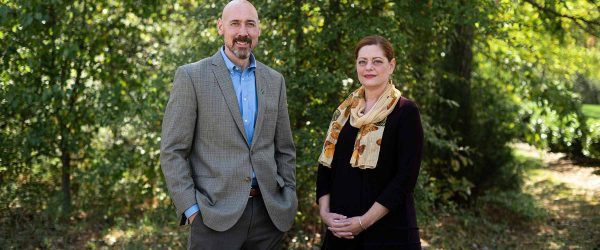Reimagined Division of Research to streamline focus on top-tier status, faculty success

Beginning Tuesday, Nov. 1, the division overseeing the University’s research activities will have new leadership, a new name and renewed focus, Chancellor Sharon L. Gaber announced today.
The Division of Research and Economic Development will become the Division of Research under the leadership of Interim Vice Chancellor John Daniels and Interim Associate Vice Chancellor Deb Thomas. Daniels and Thomas will begin long-term appointments that run through June 30, 2024, with an option for renewal after that time.
Daniels, who has been with the University for 22 years, has chaired the Department of Civil and Environmental Engineering since 2012. Thomas joined Charlotte in 2018 and serves as chair of the Department of Geography and Earth Sciences.
“Dr. Daniels and Dr. Thomas are accomplished researchers and faculty leaders who have demonstrated their commitment to interdisciplinary collaboration and service at UNC Charlotte,” said Gaber. “These attributes will be critical in fostering the creativity and innovation necessary in achieving top-tier research status. The strategic shifts in focus for the division will allow our research enterprise to be more responsive to the needs of our faculty as they educate our students and engage in the discovery that drives our success. Additionally, I want to thank Dr. Yvette Huet and Carl Mahler for their leadership as interim co-vice chancellors of the division since late August. They have been instrumental in helping lay the foundation for these important transitions.”
Among the changes taking effect Nov. 1 are:
- The Cost Analysis and Cash Management unit of the Office of Grants and Contracts Administration will join the Division of Business Affairs to maximize the resources available in processing distribution of funds and the management of faculty research awards.
- Responsibilities for economic development activities will shift to align with efforts in Corporate Engagement in the Office of External Relations and Partnerships, under the leadership of Betty Doster. This will involve moving open positions, not current staff members. All offices and units that directly support research activities will remain within the Division of Research.
- Ventureprise, the University’s innovation and entrepreneurship center for faculty, students and community members, also will temporarily become part of External Relations and Partnerships.
“The organizational changes announced today bring UNC Charlotte into alignment with well-funded competitors and aspirational institutions,” said Daniels. “I’m thrilled to work with Chancellor Gaber, Dr. Thomas and our colleagues and students to help make the pursuit of research, innovation and creative work as efficient and fulfilling as possible.”
About John Daniels, interim vice chancellor for research
A member of the faculty for 22 years, Professor John Daniels has led the Department of Civil and Environmental Engineering as chair since 2012. He also served as a program director in the Directorate for Engineering at the National Science Foundation, where he was responsible for research within geotechnical and geoenvironmental engineering, engineering education, engineering research centers and a variety of cross-disciplinary programs.
While at UNC Charlotte, Daniels has led numerical, laboratory and field-based projects, totaling more than $8 million, for utilities and consultants as well as state, national and foreign agencies. His textbook, co-authored with H.Y. Fang, “Introductory Geotechnical Engineering: An Environmental Perspective,” was released in 2006, and he has over 100 publications in various journals, book chapters, conference proceedings and technical reports. He has worked for TRC Environmental Corporation as a project engineer and is a licensed professional engineer in North Carolina.
He holds a Bachelor of Science in Civil Engineering from Lehigh University, Bethlehem, Pennsylvania, and a master’s degree and a doctorate in civil engineering from the University of Massachusetts Lowell. His research is focused on engineered water repellency, with an active award from the NSF titled “Engineered Water Repellency to Mitigate Frost Susceptibility: Decoupling Osmotic and Matric Potential.” He currently is advising three Ph.D. students, three master’s students and one postdoctoral scholar.
About Deb Thomas, interim associate vice chancellor for research
Professor Deborah “Deb” Thomas is chair of the Department of Geography and Earth Sciences. She joined UNC Charlotte in August 2018 from the University of Colorado Denver, where she was a faculty member in geography and environmental sciences for 18 years and department chair for three and half years. Additionally, she was a founding faculty member of the Colorado School of Public Health, where she held a dual secondary faculty appointment for more than 10 years.
Thomas specializes in hazards and health geography with more than 25 years in the social science application of geographic information science and technology. Her teaching and research interests focus on issues of vulnerability/resilience/equity as they relate to natural and human-induced hazards and public health, commonly emphasizing the role of technology, particularly GIS, in assessing and evaluating the intersection of human-physical systems and the built environment.
She has obtained over $2.3 million in funding from the NSF, National Institutes of Health and numerous local and state agencies. She has funded 37 students, including 19 undergraduates. She has published over 80 peer-reviewed journal articles, book chapters and reports, including the co-edited book “Social Vulnerability to Disasters.” In July 2020, she completed three years on the American Association of Geographers National Council, serving as treasurer and a member of the executive committee. An internationally respected academic, Thomas was a Fulbright Scholar to Middle East Technical University in Ankara, Turkey, and she continues to work in Tanzania as part of a 13-year partnership with the Catholic University of Health and Allied Sciences in Mwanza, Tanzania.
“The level of innovation underway makes this an exciting time to teach, study and conduct research at UNC Charlotte,” said Thomas, who earned a Master of Arts in Geography from Charlotte in 1995. “Dr. Daniels and I look forward to collaborating with our colleagues and community partners as the University’s research enterprise and creative activities continue to grow.”